Refugees’ right to work and economic integration: evidence from Ethiopia
A randomized evaluation conducted through research-policy partnership with Ethiopia's Refugees and Returnees Service.

The Oxford Martin Programme on the Future of Development (FoD) aims to produce quantitative social science research that contributes to improving livelihoods and resilience in low- and middle-income countries in the coming decade.

The programme focuses on labour markets and private sector development, studying investments in human capital, technology, and state capacity, and exploring the impact of these investments in the context of the green energy transition. It has been designed to be adaptable and flexible in its approach to better analyse and understand the key drivers of change that will shape employment opportunities and constraints facing firms, governments, and households.
The programme is directed by Professor Ian Goldin and Dr Christian Meyer. The programme has been made possible thanks to a donation by the Allan and Gill Gray Foundation.
The core research team for the FoD programme consists of independent postdoctoral researchers based at the Oxford Martin School, an interdisciplinary research centre at the University of Oxford focused on urgent global challenges. Research and policy outreach efforts are supported by several predoctoral researchers and a management team. The breadth of the programme extends far beyond the Oxford team, enabled by academic collaborators and partners across Europe and North America, Sub-Saharan Africa and South Asia.

The rapid expansion of information and communication technologies offers novel opportunities to deliver information and facilitate boosting productivity. Our researchers study the barriers to technology adoption in low- and middle-income countries and focus on how contextualized information and communication technology can improve income-generating activities, with particular emphasis on agriculture.
The escalating patterns of migration are sparking increasing apprehensions regarding their repercussions on the well-being of both refugees and host communities. Our research is specifically geared towards investigating the effectiveness of interventions designed to facilitate the integration of refugees into host communities, with a particular focus on augmenting their access to diverse economic opportunities.
The labour market functions as a dynamic ecosystem where the availability of skills and the demand for those skills converge. This intricate interplay between supply and demand stands as the determining factor shaping the livelihoods of individuals. We aim to delve deeply into how information and job search skills affect matching between employers and jobseekers and extend our focus to overcoming gender bias in hiring.
In much of the world, gender inequalities in agency, decision-making authority, labour market access, and educational opportunities persist. These disparities are deeply entrenched in cultural attitudes and are passed down from one generation to the next. Our studies highlight the pivotal role of teachers in shaping the gender attitudes of students and examine the impact of shifting teachers' attitudes towards gender rights on students' attitudes.
The education systems in low- and middle-income countries, in addition to suffering from poor learning outcomes, are highly susceptible to shocks. This vulnerability has raised concerns about learning gaps, and accelerated efforts in advancing remote learning technologies. We explore the potential of digital and non-digital technologies to address the learning crisis and avail education opportunities to the underprivileged.
In the realm of state capacity and development, the role of civil servants has emerged as a focal point of scholarly attention. Yet, amid this discourse, the significance of senior bureaucrats in leadership positions remains a relatively unexplored terrain. Our research seeks to shed light on how the human capital of senior bureaucrats can shape the trajectory of state capacity and ultimately influence the development landscape.
A randomized evaluation conducted through research-policy partnership with Ethiopia's Refugees and Returnees Service.
A new programme at the Blavatnik School of Government developed with the involvement of researchers who lead Oxford Martin School programmes will investigate the effects of digital public infrastructure (DPI) on inclusion and wellbeing in low- and middle-income countries, initially focusing on Ethiopia.
Jacob’s Ladder Africa (JLA) and the Oxford Martin Programme on the Future of Development have joined forces to conduct research on livelihoods and jobs within Africa’s green economy.
Ethiopia, one of the world's largest refugee-hosting countries, has about 930,000 refugees from South Sudan, Somalia, and Eritrea as of July 2023 (UNHCR, 2023). So, how can we ensure they can make an important contribution economically and socially?
With around 700 million people globally living on less than $2 per day, there is an urgent international agenda to eliminate extreme poverty. The Ultra-Poor Graduation (UPG) approach, first launched by the international development organisation BRAC in the early 2000s, has emerged as a powerful and proven strategy to address this issue.
Our programme on the Future of Development collaborated with researchers from the Development Policy Research Unit in the University of Cape Town to conduct an in-depth analysis of the coal labour market in South Africa.
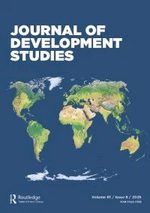
The Impact of Microcredit on Household Welfare: Evidence from Bangladesh During the COVID-19 Pandemic
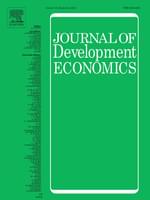
Altruism in governance: Insights from randomized training for Pakistan's junior ministers
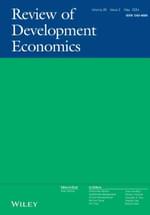
How do small formal and informal firms in Egypt compare? An analysis of firm characteristics and implications for formalization efforts
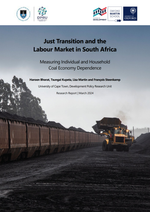
Just Transition and the Labour Market in South Africa
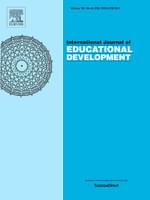
School to work transition: Employment and expectations of former madrasa students in Cox’s Bazar, Bangladesh

The Impact of Firm Downsizing on Workers: Evidence from Ethiopia’s Ready-Made Garment Industry

Information and behavior: Evidence from fertilizer quantity recommendations in Bangladesh
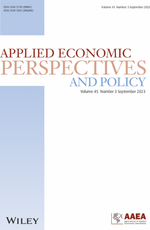
Using international migration links for early detection of COVID-19 risk exposure in low- and middle-income countries
Breaking Through Bottlenecks: Scaling Economic Inclusion in Tough Times
Takeaways from Implementing a Parent-Adolescent Intervention Targeting Early Marriage in Bangladesh
Enhancing secondary school learning: Role of remedial camps and teacher flexibility
Unravelling the Association between Shocks and Education in Bangladesh
Mobile Banking in Bangladesh: An Opportunity with Constraints?
Trust in Me: Can Parent-Daughter Interventions Build Trust, Reduce Child Marriage, and Improve Girls Education in Bangladesh?
Programme Manager (Future of Development, Work, Technological and Economic Change) - Parental Leave
Professor of Globalisation and Development
Policy and Impact Coordinator
Oxford Martin Visiting Fellow
Senior Postdoctoral Researcher
Researcher
Senior Postdoctoral Researcher
Researcher
Senior Postdoctoral Researcher
Research Manager
DPhil Candidate
Macroeconomics Research and Policy Officer
DPhil Candidate
Administrative Assistant
Researcher
Green Livelihood Roundtable: Skills development, funding necessary for Africa’s green industrial transformation
Circular Economy to fight climate change: Are countries walking the talk?
The zero-sum vaccine game: How a dose in the U.S. takes a dose away from a poorer country
How a UK aid budget cut will hollow out a world reeling from COVID-19
Coronavirus is the biggest disaster for developing nations in our lifetime
Will AI kill developing world growth?
If you found this page useful, sign up to our monthly digest of the latest news and events
Subscribe